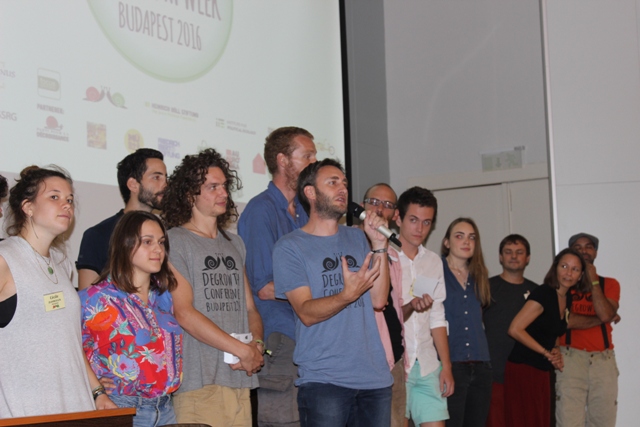By Ulrich Brand
“Business as usual” is the motto of ruling politics nowadays. The dominant public discussions and policies are staged as necessities and unavoidable adaptions to an austerity policy which is apparently without alternatives. We are assured that rising poverty-rates, the redistribution of wealth from bottom to top and the cutback of social rights and democracy are only temporary conditions until we reach the ultimate goal: bringing us back to the promising path of growth. The future is seen as the extension of the present and, accordingly, drastic decisions are being made wherever capital interests (and the interests of core employees) and the position of the wealthy are at stake. But what happens if – from a progressive and transformative perspective – larger leaps are seen as necessary? How can those who are serious about the critique of capitalistic growth and the assumingly unquestioned focus on competitiveness, about alternative types of economy and serious about the impertinences of the everyday life, be strengthened and how can they enter the political floor?
In the course of the discussions about environmental, climate and resource crises, the term “social-ecological transformation” or “great transformation” was coined. Thanks to its radical semantics, it has quite a potential for a progressive project at the height of the time: The project of a solidary modernity.
The project of a solidary modernity In its ecological essence, the great transformation is about transforming away from a capitalism that depends on fossil energy sources and is in permanent need of natural sinks and resources. It is high time to initiate the often-quoted post-fossil age. Many take another step further and think of a great transformation away from a neoliberal capitalism that does not only push ecological destruction, but also social division and the decline of solidarity. Besides the ecological dimensions, their focus is on the social and economic dimension of the matter. Even fewer understand it as a transformation away from capitalism as such, which means away from a society in which central areas of societal life are first and foremost subject to the principles of profit and economic growth. This would not only mean to weaken the financial markets, but the economic and political power of capital altogether and its structural dominance in society.
Growth as destabilizing factor The term “social-ecological transformation” develops its special significance in the face of a society whose predominant logic of change – the logic of making profit, accumulating capital and expanding economic activities – produces ever stronger and less controllable crises. In other words: Growth itself has become a destabilizing factor, not only under the conditions of financial-market capitalism. The continuous growth in producing (short-lived) goods and services also causes potential and real instability. The required resources have to be secured, which is not always conflict-free, and climate change too generates many uncertainties including the infamous “tipping points” of the local or regional climates.
A changed social constellation A political and social left – including the political and social green arena - which is prepared for the future will first have to understand and then politically pick up this changed social constellation. This is because a real social-ecological transformation is not only about redistributing the cake. Rather, the cake itself has to be baked differently and, in the industrialized countries, become significantly smaller. Less cars, less air traffic and meat consumption, and also turning back from a highly industrialized to a sustainable agriculture. However, these conversion processes, for example in the mobility sector, must not be pursued at the expense of the employees. Instead, other types of mobility - which we already know - should be enforced, in addition to the avoidance of the so-called forced mobility.
A new understanding of prosperity Hence, a social-ecological transformation is not only supposed to tackle the problems and crises stemming from the capitalistic drive for expansion and profit orientation, but it has to be embedded in a concept that puts our society on a different basis for creating prosperity, thereby giving the transformational process itself another direction and logic. Only with this, the progressive sociopolitical spectrum can enter the floor again and gain credibility and creative power. It is about livable conditions which are appealing to people - in short: about a new model of prosperity, other forms of alimentation and mobility, of energy supply and communication, of housing and clothing. And all of this under conditions of strong ecological restrictions with all related implications for the distribution of power and wealth.
Building on what is already available However, we do not have to start from scratch. There are manifold discussions, proposals and practical approaches already available. More and more people are defending themselves against the impertinences of current politics and already strive to live and work differently: socially, ecologically and together.
This has strategic political consequences: in order to modify the mentioned powerful logics in the direction of a solidary modernity, a transformative left is required that can deal with conflicts in a constructive way and is not only able to distribute in a better way, but also to intervene in the very mode of social (re-)production where powerful forces are extremely well organised.
Parties as focal points and part of a broader alliance I do not think that political parties alone are able to do the trick. We rather need many actors with progressive claims and actions to bring forward the project of a solidary modernity. Among them are social movements, often in the margins of society, as well as progressive associations and NGOs, closer to the mainstream. Among them are critically-minded people and groups in science, think-tanks, churches, media and progressive entrepreneurs. Among them are also people who might be willing to engage with alternative day-to-day practices in a non-organizational manner, but who need to be offered opportunities for doing so.
Bringing together parliamentary and non-parliamentary forces Despite all this, political parties remain focal points and – as expression and part of broader social debates – possible driving forces. If the left wants to formulate adequate answers to the challenges mentioned above, there is no way around developing a progressive understanding of prosperity which overcomes the formula “growth and distribution”. From a broad progressive perspective, it is as Hans Thie puts it in his newly published book, it is about a “red green”, it is about connecting social and ecological issues rather than playing them off against each other - as it was the case before. In some way, politics need to be re-invented. “Crossover” as a process brings together parliamentary and non-parliamentary forces. All in all, it is about initiating, enforcing and defending social-ecological transformations in parties, public institutions, associations, unions, enterprises and their interest groups, social movements and the general public through various initiatives. All these processes will face leaps and backlashes and will not take place simultaneously. There is no master plan for this, but there is a project which can be formulated.
Translation: Christiane Kliemann
> Comment this article on the German blog "Postwachstum"______________________________________
Ulrich Brand researches and teaches as professor for International Politics on the subjects globalization and its critique, global governance and transformation of the state, environmental and resource politics as well as social movements at the University of Vienna. He is, amongst others, member of the board of trustees of the Solidary Modernity Institute (ISM), of “Blätter für deutsche und internationale Politik” and part of the scientific advisory board of Attac. He was member of the Enquete Commission „growth, well-being, quality of life“ of the German Bundestag (January 2011 to June 2013), where he advocated for projects of a political crossover. He is member of the advisory board of the Degrowth 2014 Conference.

We are starting 2020 full of enthusiasm for all that is to come! If you want to be involved in the degrowth movement you just need to roll up your sleeves because in this new year, there will be plenty to do. Here is a list of the activities that planned for 2020 so you can already mark them in your calendar. Crowdfunding During the first months of the year, we will be going through the fi...
Finally it is done: all texts from the project "Degrowth in Movement(s)" to be published in English are now available online. Representatives from different social movements share their perspective on degrowth and illustrate commonalities, differences and points of critique. In Germany, last year's publication of the respective German texts, videos and pod casts marked the kick-start for an ope...

The fifth international Degrowth Conference is over, the call to host the sixth has been opened. A lot could be said about the conference, yet I do not intend to give a comprehensive overview, nor examine how it stands in relation with the former conferences. Instead, I want to share five aspects of the conference, which I found particularly insightful. 1. A Degrowth Conference in Hungary? ...